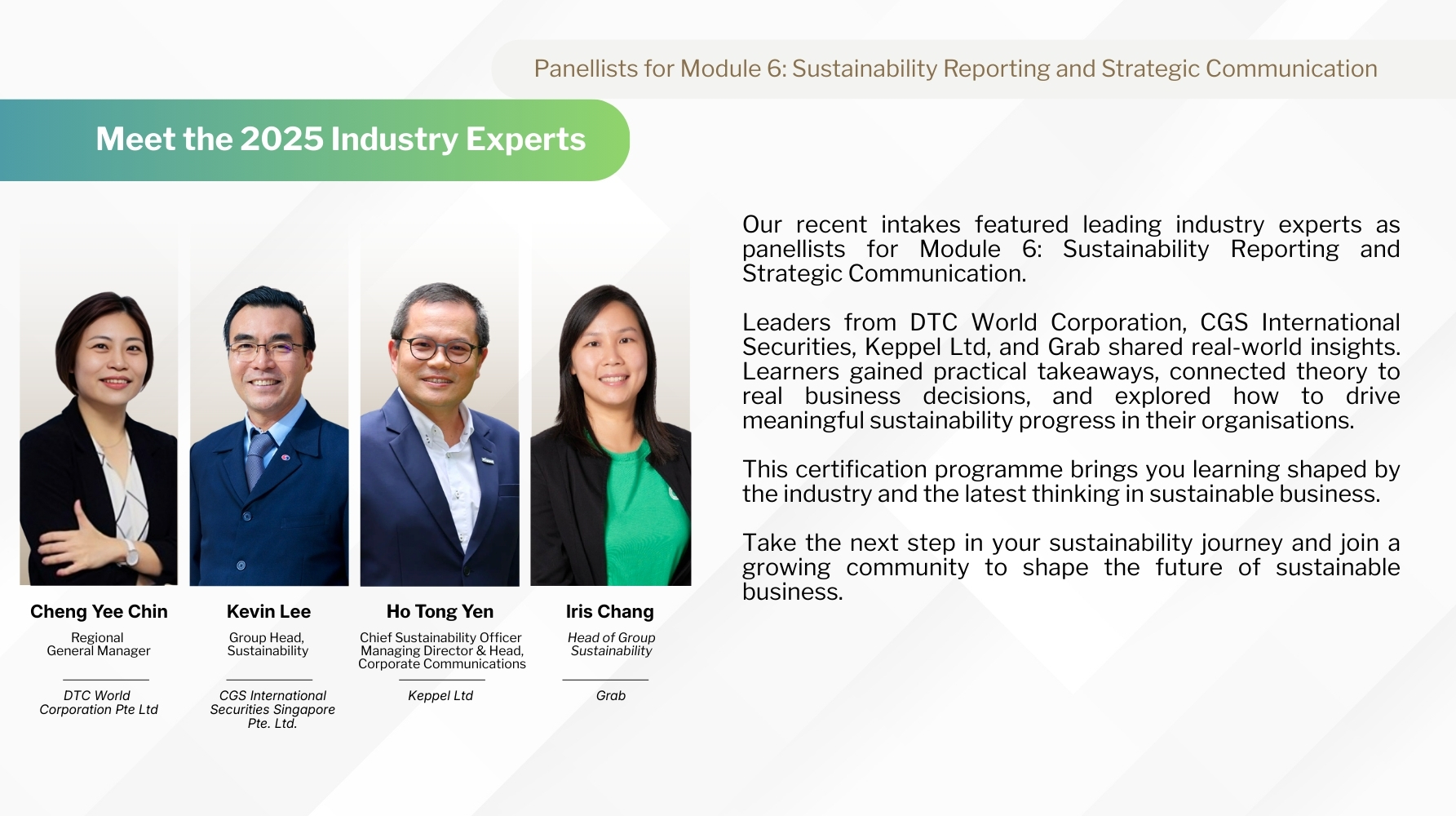Advanced Certificate in Sustainability and Sustainable Business Module 6: Sustainability Reporting and Strategic Communication
- Digital Marketing & Comms
- Environmental, Social & Corporate Governance
This programme is conducted on-campus.
To use your SkillsFuture Credit, please submit your claim through our payment portal. Do not submit the claim manually via the SkillsFuture page. Please refer to our step-by-step guide here.
2 days (9am - 6pm)
Singapore Management University
Who Should Attend
Professionals and business owners who are keen on deepening their skills and knowledge in corporate and business sustainability.
Overview
Companies are facing an increasing need to disclose ESG information to a variety of stakeholders such as investor analysts, shareholders, business partners, consumers and the authorities such as the National Environment Agency and SGX.
The Sustainability Report is an important tool that showcases a firm's values and demonstrates the link between its strategy and sustainability performance. The value of the sustainability reporting process lies in communicating key, pertinent information and demonstrating a management commitment to managing the triple bottom line by identifying and addressing environmental and social risks, alongside financial risks.


UN Global Compact Network Singapore (GCNS) is the Singapore chapter of the United Nations Global Compact.
As the national lead agency promoting corporate sustainability, GCNS provides an ecosystem for companies to align strategies and operations with universal principles on human rights, labour, environment and anti-corruption, and take actions to achieving the United Nations' Sustainable Development Goals (SDGs). Through various platforms for multi-stakeholder engagement and collective action, GCNS advances the stewardship of sustainable business practices and Singapore’s national agenda of becoming a regional sustainable business hub. In addition, GCNS nurtures the next generation of responsible business leaders through its youth initiatives. GCNS is a stakeholder of the Global Reporting Initiative and supports the Singapore chapter of the World Bank Group's Carbon Pricing Leadership Coalition (CPLC).
Learning Objectives
- Be equipped to discuss the business case for ESG disclosure
- Receive the latest updates on the sustainability reporting landscape
- Understand key reporting frameworks and their metrics
- Strategically leverage sustainability reporting to communicate with stakeholders such as investors, asset owners and regulators
- Implement an internal assessment of corporate performance and identify gaps
- Understand the process of curating a sustainability report
Topic/Structure
Day 1
Part A: Sustainability Reporting
- Introduction to sustainability Reporting
- Introduction to sustainability reporting frameworks including SGX Sustainability Reporting Guidelines, Global Reporting Initiative (GRI) Standards, Integrated reporting Sustainability Accounting Standards Board (SASB)
- ESG Disclosure expectations; Task Force on climate- related Financial Disclosures (TCFS), Carbon Disclosure Project, Science Based Targets
- Preparing a Sustainability report
- Materiality and Stakeholder Engagement
- Introduction to Assurance
Part B: Introduction to RICE Tool
- How to use the RICE tool to do an internal assessment, and prepare a simple sustainability report
Day 2
Part C: Going deeper into the Frameworks
Part D: Presentation and Critique of Projects
- Review of Sustainability Reports, identifying best practice reporting trends
Assessment
Participants will undertake a project to review and analyse sustainability reports and assess what to look for to identify a good report. The project will also provide an opportunity to develop a simple sustainability report.
As part of the requirement for SkillsFuture Singapore, there will be an assessment conducted at the end of every module. The mode of assessment, which is up to the trainer’s discretion, may be an online quiz, a presentation or based on classroom exercises.
Participants are required to attain a minimum of 75% attendance and pass the associated assessment in order to receive a digital Certificate of Completion.
Fee Table
| EMPLOYER-SPONSORED | |||
|
PARTICIPANT PROFILE |
SELF-SPONSORED |
SME |
NON-SME |
|
Singapore Citizen < 40 years old Permanent Resident LTVP+
|
$944 (After SSG Funding 50%) |
$624 (After SSG Funding 50% |
$944 (After SSG Funding 50%) |
|
Singapore Citizen ≥ 40 years old |
$624 (After SSG Funding 50% |
$624 (After SSG Funding 50% |
$624 (After SSG Funding 50% |
|
International Participant |
$1,744 (No Funding) |
$1,744 (No Funding) |
$1,744 (No Funding) |
All prices include 9% GST
Please note that the programme fees are subject to change without prior notice.
Post Secondary Education Account (PSEA)
PSEA can be utilised for subsidised programmes eligible for SkillsFuture Credit support. Click here to find out more.
Self Sponsored
SkillsFuture Credit
Singapore Citizens aged 25 and above may use their SkillsFuture Credits to pay for the course fees. The credits may be used on top of existing course fee funding.
This is only applicable to self-sponsored participants. Application to utilise SkillsFuture Credits can be submitted when making payment for the course via the SMU Academy TMS Portal, and can only be made within 60 days of course start date.
Please click here for more information on the SkillsFuture Credit. For help in submitting an SFC claim, you may wish to refer to our step-by-step guide on claiming SkillsFuture Credits (Individual).Workfare Skills Support Scheme
From 1 July 2023, the Workfare Skills Support (WSS) scheme has been enhanced. Please click here for more details.
Employer Sponsored
Enhanced Training Support for SMEs (ETSS)
- Organisation must be registered or incorporated in Singapore
- Employment size of not more than 200 or with annual sales turnover of not more than $100 million
- Trainees must be hired in accordance with the Employment Act and fully sponsored by their employers for the course
- Trainees must be Singapore Citizens or Singapore Permanent Residents
- Trainees must not be a full-time national serviceman
- Trainees are eligible for ETSS funding only if their company's SME status is approved prior to the course commencement date. To verify your SME's status, please click here.
Please click here for more information on ETSS.
Absentee Payroll
Employers who sponsor their employees for the course may apply for Absentee Payroll here. For more information, please refer to:
AP Guide (Non-SME Companies)
Declaration Guide (SME Companies)
Intake Information
Intake 26: 14 Jul & 25 Aug 2026 [Open for Registration]
*Registration will close 5 calendar days before the course start date, or once the class is full, whichever comes first.





